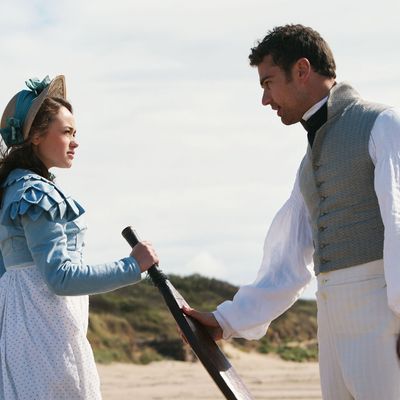
The vast majority of Sanditon, a new Jane Austen adaptation debuting this Sunday on PBS’s Masterpiece, will fulfill everything you could ever want in a miniseries version of an Austen novel. It’s an exquisite production, both beautiful and thoughtful. It’s adapted in ways that feel smart and human, while also pumping some helpful friction into the story. Then, at the end, Sanditon makes choices that will leave most viewers feeling, at best, extremely perplexed. At worst, it may feel like a betrayal.
Sanditon has an unusual history compared with the more familiar Austens — your Pride and Prejudices, your Emmas. It’s Austen’s last novel, and she had barely managed to get the main characters and plot mechanisms in place before she stopped working on it in March 1817, likely due to illness. Austen died that July, and the novel she left behind, which she originally called The Brothers, establishes much of the groundwork also deployed in this Sanditon adaptation.
Charlotte Heywood (Rose Williams) is the young daughter of a gentleman farmer, naïve but well-read. After a chance encounter she leaves her home and travels to Sanditon, a sleepy seaside town that her host, Tom Parker (Kris Marshall), is obsessively intent on developing into a renowned coastal resort. Parker’s brother Sidney is, and I cannot say this firmly enough, an absolute hunk. (Sidney Parker is played by Theo James, who Masterpiece viewers may recognize as Kemal Pamuk, the Turkish aristocrat Lady Mary kills via sexual intercourse in the first season of Downton Abbey.) He broods. He is gruff and patronizing, even though his family swears that he’s actually quite loyal. He goes sea bathing and leaves his clothes in a heap on the beach, ready to be stumbled upon by Charlotte as she’s out for an innocent cliff walk.
Watching Charlotte and Sidney clash and then slowly come together is as appealing an experience as any Austen adaptation in recent memory. Charlotte, especially, feels more relaxed than the more buttoned-up Austen protagonists, and she rebels against some of Sidney’s ideas in ways more loaded than the familiar “he should be nicer to people” territory. Over the series’ eight episodes, they fight, they ignore each other, they try to piece through dramatic twists together, they’re enemies, and they’re eventually friends. Sanditon gives them quite a bit to wrestle with, more than many Austen couples.
Some of that comes from Sidney Parker’s ward, Georgiana Lambe, a character Austen describes as a “half mulatto” in the novel. Lambe, played in the series by Crystal Clarke, doesn’t hide her disgust with Sanditon’s racist gentry, even to the point of insulting Lady Denham, the story’s cranky, wealthy patroness. Sanditon also insists on weaving the sugar trade and Georgiana’s background into the romance between Charlotte and Sidney, a move that forces the series to address England’s colonialist history head-on and gives the relationship more heft. (In this way, it’s most like the 1999 Mansfield Park, one of the few major Austen adaptations that indicts the story’s villains with crimes beyond social impropriety.) By the time the miniseries arrives at its final installments, the level of anticipation for the moment Sidney and Charlotte fall into each other’s arms reaches painful heights.
This series has already aired in the U.K., so if you want to look up the ending, all of that information is available to you. If, like me, it doesn’t even occur to you to look up how Sanditon ends because its conclusion feels absolutely inevitable, you may find yourself taken aback by the choices this series makes. You may find yourself so taken aback that your mouth falls open in shock as you frantically scramble to figure out whether it was actually the last episode. You may look up the Sanditon Wikipedia page to see how much of this novel Jane Austen finished, and how many versions of the ending have been written by other authors. You may do some digging to try to figure out if this series was canceled unexpectedly, or if this was always meant to be the last installment. You may wonder if you are being punked.
The previous paragraph does not sound like a recommendation for Sanditon, and it’s tough to say how to square the final episode’s ending with the truly lovely production that precedes it. Because regardless of what Sanditon does at the end, the first episodes are completely enjoyable, and as Charlotte says to a friend when the series comes to a close, “I do not regret the time I spent there.” If you come to a Jane Austen story demanding a very specific kind of resolution, though, it may be worth preparing yourself for something quite different than what you want.


